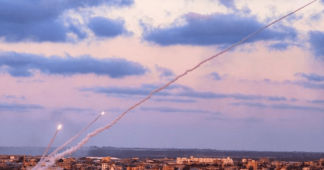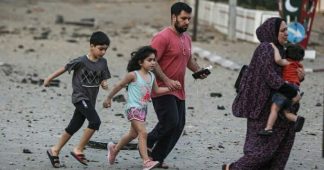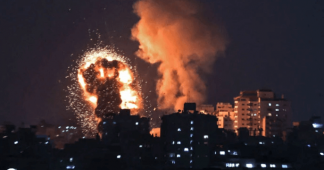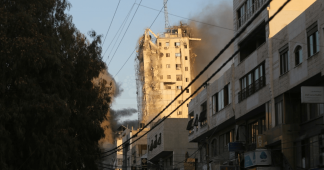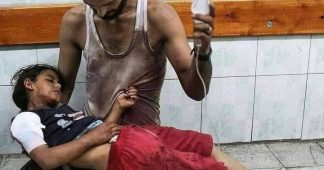May 18, 2021
The death toll in Gaza has reached 213, including at least 61 children, as Israel continues to attack the besieged area by air, land and sea using U.S.-made warplanes and bombs. The death toll in Israel stands at 11 from rockets fired from Gaza. Israel is facing increasing criticism for targeting doctors in its attack, and its airstrikes have reportedly damaged at least 18 hospitals and clinics, according to the World Health Organization. The attacks on medical staff and facilities are a “nightmare,” says Dr. Rasha, a Palestinian internal medicine physician working in Gaza who asked not to use her full name for safety reasons. “I think this is targeted to increase the overwhelming of the already overwhelmed healthcare system,” she says.
Transcript
AMY GOODMAN: The death toll in Gaza has reached 213 as Israel continues to attack the besieged area by air, land and sea using U.S.-made warplanes and U.S.-made bombs. Health officials in Gaza say the dead include 61 children and 36 women. Over 1,400 Palestinians have been injured. The United Nations says 58,000 Palestinians have been displaced. Meanwhile, the death toll in Israel stands at 11 from rocket attacks fired from Gaza.
Palestinians across Gaza, the West Bank and Israel are staging a general strike today. In the West Bank, Israeli forces have fired tear gas and rubber bullets at protesters in Bethlehem.
On Monday, President Biden expressed his support for a ceasefire in Gaza during a phone call with Israeli Prime Minister Benjamin Netanayhu. But Biden stopped short of directly demanding Israel halt its assault, despite growing pressure from Congress, where over two dozen Democratic senators have backed an immediate ceasefire. After Biden’s call, Israel continued its attack on Gaza, which has now entered its ninth day. At the United Nations, the United States once again blocked the U.N. Security Council from backing a ceasefire.
Israel is the largest recipient of U.S. military aid, receiving some $3.8 billion a year. In recent weeks, the Biden administration approved the sale of $735 million in precision-guided weapons to Israel. But House Foreign Affairs Committee Chair Gregory Meeks is expected to ask for the sale to be delayed to give lawmakers more time to review it. Israel has relied heavily on U.S.-made weapons during its assault. Israel reportedly used a GBU-31 bomb made by Lockheed Martin to bring down a high-rise building on Saturday which housed the offices of many media outlets, including the Associated Press and Al Jazeera.
Israel is also facing increasing criticism for targeting doctors and health clinics. On Monday, an Israeli strike damaged the only COVID-19 laboratory in Gaza. On Sunday, a massive Israeli airstrike killed Dr. Ayman Abu al-Ouf, who headed the coronavirus response at Shifa Hospital, Gaza’s largest hospital. He and two of his teenage children died in an Israeli bombing of the residential area of Gaza City that killed a total of 30 people. Another prominent doctor from Shifa Hospital, Mooein Ahmad al-Aloul, one of the only neurologists in Gaza, was killed in an airstrike on his home. Israel has also bombed many of the roads leading to Shifa Hospital, making it harder for ambulances to bring patients. According to the World Health Organization, Israeli strikes and shelling have damaged at least 18 hospitals and clinics.
We’re joined now by two Palestinian doctors. Joining us from the West Bank city of Ramallah is Dr. Mustafa Barghouti. He’s a member of the Palestinian parliament, head of the Palestinian Medical Relief Society, who has been leading efforts to manage the COVID pandemic in the West Bank and Gaza. And in Gaza, we’re joined by Dr. Rasha. To protect her safety, Dr. Rasha has asked we only use her first name and not show her face.
Dr. Rasha, let’s begin with you. You are at ground zero, in Gaza. You knew the doctors who were killed. Can you start off by describing the situation on the ground?
DR. RASHA: Yes. Hello, and thank you for allowing me to speak about how we — life these days in Gaza. And I would like to submit the humanitarian aspects of this war as a physician and as a Palestinian and as a mother, at the start.
First of all, you can imagine that you are — there is no place safe in Gaza now. If you imagine that you are walking in a city, and there is no single path in the city that’s not targeted. They’re targeting the residential buildings, the healthcare systems, even the street itself, walking people, people on bike, on motorbike, in their car, and mosque, even the beach, the restaurants, the press office. Whatever you can see by your eye while you are walking in the city has been targeted. And this is actually — it’s awful.
And it makes even violations for the movement for the ambulance, which are going to the hospitals. The entry to the Shifa Hospital, the main hospital in Gaza, has been — all the roads leading to the hospital have been destroyed, and which make the ambulance need to make a long turn before they reach the hospital with injured patients.
Even the main electricity station, which has been targeted in 2008, has been targeted again, and now we have no electricity. And this has been targeted again, and there is no electricity, electricity coming only two to three hours per day. And we are not anticipating when it’s coming. We are using generator, and even there is no fuel enough to supply the generator. And now I have no electricity and no electricity from the generator, as well, for me personally.
The internet tower has been targeted, and then we have very, very access to internet. Even this, I think this is to target speaking out and to prevent us from talking and explaining the situation.
The schools, the kindergartens, the factories, the governmental buildings, the banks, the ministry buildings, primary healthcare facilities, including, as you mentioned, the Doctors Without Borders clinics and office, have been targeted, as the MSF spokesperson has said two days ago. The residential home, which is the main — the main catastrophe and the main disaster is that the residential building and towers has been targeted, and it has been destroyed over the people who are living inside.
And as you mentioned, two doctors have been killed, including one of them was my mentor, Dr. Ayman Abu al-Ouf. It was actually a nightmare. And when he was targeted, it was — I remember the night very well. We were following the news, and we know where he is living. He lived close to Al-Shifa Hospital. And we used to say that Dr. Ayman is living in the hospital, actually, because whenever you go to the hospital, you find him. If he has a critical case, he has to go home and come back to the hospital every time to check his cases. He is a very committed person, and he was my teacher. He was a member of the COVID committee. He was training the post-resident doctors and the internship and medical school doctors. His loss is really a big loss to the medical staff in Gaza. Really, I cannot imagine that he has been killed. And I think it’s a nightmare, not more, as I hope I can — I will see him soon. Like, I cannot imagine, actually.
I remember that night. We were following the news, of three nights ago. And I sleep late, at around 4 a.m., and my husband woke me at 7:00 or 8:00, and he told me, “You know Dr. Ayman, yes? Ayman Abu al-Ouf.” Then I told him, “Don’t say that,” because I was anticipating what I hope it will not occur. And he said, “He has been killed.” And his children and his wife, his father and his mother are still under rubble, and they did not manage to get them early in the morning. Me and all my colleagues that work for the ward, we are assuring each other, “He is killed, but his children…” There was no news about whether they are still alive under the rubble or not, because there is some stories some people survive — rarely people survive, and we was hoping that anyone of his family survived. Unfortunately, by the midday, we know that no one from his family survived. And it was a huge loss to humanity and to the medical field in Gaza. Also, another medical doctor, Ahmad al-Aloul, who was a neurologist at Shifa Hospital, has been killed in the same strike. It’s awful.
And we see they destroy buildings during night while people are sleeping in their homes. There is no alarm, as they claim. They claim that “When we are targeting residential buildings, we are sending alarm to the people.” But this is not the truth. This is not the truth. To be honest all the time, most of the time they are not sending alarms.
And as you see in the news, many homes have been destroyed over the people, including a refugee camp beside the beach. It’s called al-Shati. About five days ago, also the same, they targeted a home, with around 12 to 15 persons from one family have been killed, with only a 5-month-old child survive. It was a nightmare, and I cannot imagine — as a mother, I cannot imagine how this 5-month baby will survive, what we will tell him in the future, who will take care of him, how he will think about the beach in the future, how he will look at Israel. I don’t know how he will grow up, this baby, and I was thinking about if I can give this baby — to bring him to keep him with my children in my home. [inaudible] —
JUAN GONZÁLEZ: Dr. Rasha, my condolences to you and your colleagues for the death of Dr. Ayman and the terrible destruction. But I wanted to ask you — there were other medical facilities have been hit, as well. Doctors Without Borders said that on Sunday there was an Israeli missile struck a clinic that they were running. Is it your sense that the medical facilities are being targeted by the Israelis?
DR. RASHA: Yeah, I think it’s targeted. It’s intentionally targeted. Even if they claim that there is something underneath or behind it or surrounding it, it’s intentionally targeted. MSF is known that it provides service for pain and for trauma patients. And there was a plan to review activity for care of the traumatized patients or to provide briefing and to care for the injured people during this war. But, unfortunately, the biggest clinic for MSF has been targeted and is structurally damaged. The sterilization unit on the clinic has been damaged. And even the roads which go into the clinic have been completely destructed.
So, I think this is targeted to increase the overwhelming of the already overwhelmed healthcare system. I am sure that if this belong more — this will be long more, the healthcare system will be overwhelmed, and the capacity is limited, which is already limited due to continued siege on Gaza. So, I guess this is intended. As I mentioned, the streets leading to the hospital have been targeted, for Al-Shifa Hospital. And the entry for Al-Aqsa Hospital in Deir al-Balah in the middle of Gaza also has been targeted, and one person was killed in front of the hospital during this target. So, it makes no sense to target the streets surrounding the hospital. And it’s a humanitarian disaster if you are not only targeting people, but targeting the place where people can be treated. This is another crime that they should be accounted for.
JUAN GONZÁLEZ: Also, the main clinic responsible for COVID care and the laboratory doing COVID testing were struck. Gaza was already facing a huge problem, as much of the rest of the world, even worse than other parts of the world, in terms of the pandemic. How is this — how have you been able to manage in this situation?
DR. RASHA: Actually, before starting of the war, there was almost complete lockdown in Gaza due to increase, the pandemic, directly in Gaza. There was around 230 people die every day from COVID. And the hospital and the healthcare system for COVID care was already overwhelmed. My friends and my friends who are working in COVID unit, in the ICU and in the ward, ICU care ward, already mentioned that they do not have capacity and it’s overwhelmed.
And Gaza was doing the precaution to control the pandemic. However, there is only one lab in Gaza, central lab, which was doing the COVID tests, and it was also like a store where they store the vaccine, and they make plans, and they’re meeting to plan for the COVID. And this has been targeted.
During the war, because of the restriction more, the number of the cases which diagnose with COVID decrease, but it’s due to a decreased people movement and seeking healthcare in the hospitals from the war. But no one knows the actual number of cases with COVID, who are not tested, who are afraid from moving from home to do the test. And the deputy prime — sorry, minister of health, Dr. Yousef Abu al-Rish, said that they are not able to do any COVID tests since yesterday.
So, it will be double the humanitarian crisis. There will be, in addition to the war, to the victims, the COVID which could not be diagnosed. Even the vaccination service, which was started in Gaza Strip around two to three months ago, this will be interrupted. All the COVID — and also a lot of big members of the COVID committee, like Dr. Ayman, also it will have impact on COVID control committee and COVID control program. And I think that for the upcoming days, that we will have — we will see a disaster, humanitarian and healthcare disaster, especially also if you add on electricity problem and interruption in the electricity supply to the hospital and the vital place like the ICU setting, which are dependent for ventilation patients. Electricity interruption also has an impact on this.
AMY GOODMAN: Dr. Rasha, I want to thank you for being with us — please, stay safe — a Palestinian internal medicine physician working in Gaza.
Published at www.democracynow.org
